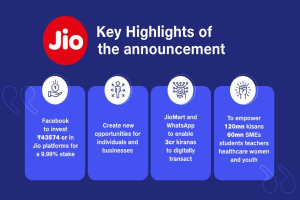Facebook’s Investment in Reliance Jio: Lunging Ahead of Walmart and Amazon
Amitendu Palit
28 April 2020Summary
Facebook’s investment of nearly US$6 billion (S$8.5 billion) in Reliance Jio entrenches it deeply in India’s online retail. WhatsApp’s vast subscriber base in India and its digital payments platform, when coupled with the data and telecommunication services of Jio, results in a greater competitive advantage over rivals Amazon and Walmart. The investment also enables Facebook more leverage in influencing India’s data policies.
Facebook’s acquisition of a 10-per cent stake in Reliance Industries’ Jio Platforms Ltd has significant implications for Indian e-commerce.
Worldwide, efforts by countries to contain the spread of COVID-19 have resulted in closure of non-essential services and activities. Essential services remain functional in most countries in varying degrees. Authorities, businesses and consumers have been heavily relying on digital delivery platforms for the supply of food, groceries and medicines. In Singapore and several other countries, consumers can purchase non-essential products like garments and electronic items online. In India, e-commerce encountered problems during the initial days of lockdown but gradually, Amazon, Flipkart and other digital marketplaces overcame these issues and began supplying essentials.
There is clear acceptance worldwide, including among several business and industry actors in India, that COVID-19 has affirmed the salience of online shopping and contactless delivery, as a safer and more efficient practice. With online delivery set to become the new normal in business-to-consumer interface as India grapples with the challenges of containing COVID-19, e-commerce assumes critical importance.
The Facebook-Reliance deal would significantly influence e-commerce in India, a country with more than half a billion internet users. WhatsApp, the social media messaging platform owned by Facebook, has 400 million users in India, roughly two-fifth of its two billion global users. Facebook and WhatsApp would naturally be keen on exploiting business opportunities which such a vast market offers.
WhatsApp has been advancing into India’s e-commerce space through its payments platform WhatsApp Pay, which is aligned with the Unified Payments Interface application of the Indian government. WhatsApp users in India can now be seamlessly integrated into a wide e-commerce space through WhatsApp Pay, and Reliance Retail and Jio platforms – the telecommunication arm of Reliance Industries Limited – though an agreement entered into by the three. Reliance Jio’s telecommunication subscription base is as large as that of WhatsApp. While many Jio subscribers are currently using WhatsApp, there are those who aren’t, and can further augment WhatsApp’s users in India, enhancing the commercial prospects of the deal.
India’s e-commerce space has been witnessing prominent presence and active buying interest of American retailers. Walmart’s acquisition of more than 70 per cent equity stake in Flipkart in August 2018 was one of the world’s largest e-commerce purchase deals. The deal narrowed market rivalry between Walmart and Amazon in Indian online retail space. Both Walmart and Amazon have been ‘marketplace’ entities in India, engaging in online buying and selling as third parties.
The ‘Americanisation’ of e-commerce in India led to expected backlash from local traders, both offline and online. Policy changes subsequently introduced by the Indian government put both Amazon and Walmart at a disadvantage by restricting them from offering deep discounts, greater sourcing from select vendors and control over inventories. These restrictions, however, do not apply to e-commerce entities characterised as ‘inventory’ operators – a segment blocked from foreign direct investment (FDI).
The Facebook investment capitalises on this discriminating policy. By becoming a minority stakeholder in Jio and tying up with Reliance Retail and Jio through WhatsApp, Facebook, while abiding by the restrictions on foreign investment in inventory e-commerce entities, will, nonetheless, obtain the benefits enjoyed by the latter, which are confined to domestic e-commerce platforms, through its partner Jio and its group businesses, like Reliance Retail. This would give it a decisive competitive advantage over Walmart and Amazon.
It is also noticeable that the Facebook investment comes at a time when India has imposed greater restrictions on Chinese investments by subjecting FDI from countries with which it has land borders to non-automatic government approval. While the rules do not prohibit Chinese acquisitions, such efforts, for example by Alibaba or Tencent in India’s e-commerce space, would be practically fruitless in the current milieu. In the process, however, the domination of India’s e-commerce by American retailers is exhaustive: a pill that ‘swadeshi’ lobbies like the Swadeshi Jagran Manch, an affiliate of the Hindu nationalist Rashtriya Swayamsevak Sangh, have to swallow, however bitter.
The deal also has far-reaching implications for India’s data governance policies. Facebook and WhatsApp have been opposed to India’s local data storage rules. WhatsApp has also brushed with Indian authorities on its reluctance to decrypt its end-to-end encrypted messages, if so desired by national authorities. A 10-per cent stake in Reliance Jio increases Facebook’s leverage in influencing Indian e-commerce policies. More so given the investment commitment at a time, when long-term FDI prospects for India look dim with global capital flows drying up due to COVID-19.
. . . . .
Dr Amitendu Palit is a Senior Research Fellow and Research Lead (Trade and Economic Policy) at the Institute of South Asian Studies (ISAS), an autonomous research institute at the National University of Singapore (NUS). He can be contacted at isasap@nus.edu.sg. The author bears full responsibility for the facts cited and opinions expressed in this paper.
Photo credits: Jio Twitter page
-
 More From :
More From :
-
 Tags :
Tags :
-
 Download PDF
Download PDF



